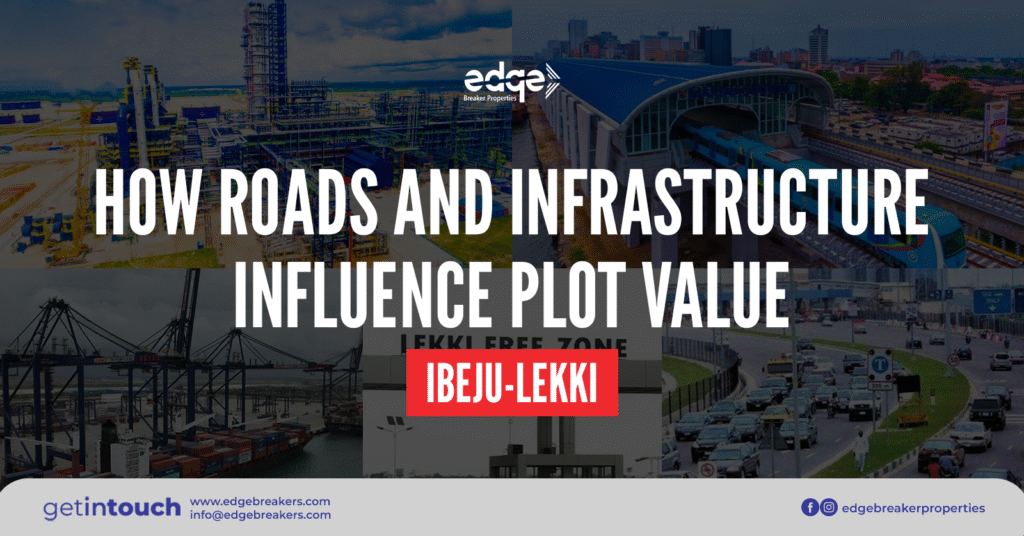How Roads and Infrastructure Influence Plot Value: IBEJU LEKKI

Introduction
Infrastructure (development) is the cornerstone of real estate value. Roads, drainage systems, power supply, and access to major developments play a critical role in determining how plots (land) appreciate over time. This principle is evident in Ibeju-Lekki, one of Nigeria’s most rapidly transforming investment corridors. Our estates: Edge Palace, Edge Place, Edge Court, Edge Villa, and Edge Vintage, offer practical examples of how strategic infrastructure can significantly impact land prices.
Road Networks as Drivers of Accessibility and Value
The Lekki–Epe Expressway expansion and the development of arterial roads linking Eleko Junction, the Lekki Free Trade Zone, and surrounding communities have significantly enhanced accessibility. Good road connectivity reduces travel time, opens up communities for residential and commercial use, and position’s land along these routes at a premium.
Plots close to the expressway or directly connected to internal road networks in planned estates are already seeing higher demand and faster appreciation than those in areas with poor access.
Mega Projects are Elevating Land Values
Ibeju-Lekki has become a magnet for investors because of the scale of ongoing projects. These developments illustrate how infrastructure directly influences land values:
Dangote Refinery & Petrochemical Plant: The largest single-train refinery in the world is attracting a workforce and creating housing demand in nearby communities.
Lekki Deep Sea Port: Now operational, the port enhances trade and logistics, creating commercial demand for warehousing and distribution hubs.
Lekki Free Trade Zone: Covering over 16,000 hectares, it is driving multinational interest and stimulating industrial development.
Proposed Lekki International Airport: With plans to handle millions of passengers annually, it is set to raise the value of surrounding plots (land) dramatically.
Lagos Metro (Green Line): The proposed rail line from Marina to the Free Trade Zone promises seamless connectivity, further unlocking real estate potential.
Each of these projects reinforces the principle that infrastructure is the anchor of appreciation. As they progress, demand for both residential and commercial plots in Ibeju-Lekki continues to surge.
Planned Communities and Urban Development
Beyond individual projects, Ibeju-Lekki is experiencing structured estate development. Planned communities with drainage systems, paved internal roads, water, and electricity provide additional appeal. Investors prefer such developments because they reduce the risk of flooding, improve livability, and ensure long-term value retention.
Market Dynamics: The “New Lagos”
With its proximity to Epe, Lekki Phase 1, and the emerging coastal corridor, Ibeju-Lekki is frequently referred to as the “New Lagos.” Land prices have witnessed exponential growth, with some areas appreciating by over 300% within a few years. This growth is directly linked to the rollout of road networks and other establishment of strategic infrastructure.
Plots that once sold for a few million naira have multiplied in value, a clear reflection of how infrastructure dictates appreciation. As projects like the refinery and seaport near full capacity, analysts project even greater returns in the short to medium term.
Balancing Growth with Sustainability
While the rapid development in Ibeju-Lekki is a positive driver for investors, it also presents challenges, such as community displacement and environmental concerns. For long-term stability, both investors and policymakers must ensure that growth is inclusive and sustainable, creating lasting value for residents as well as stakeholders.
The transformation of Ibeju-Lekki underscores a timeless real estate truth: roads and infrastructure are the engines of land value. Improved connectivity, industrial mega-projects, and urban planning have collectively turned the area into one of Nigeria’s most attractive investment destinations.
For investors seeking high returns, Ibeju-Lekki is a living case study of how infrastructure reshapes not just landscapes, but also financial futures.
Oluwatosin Damilare
Marketing Department

